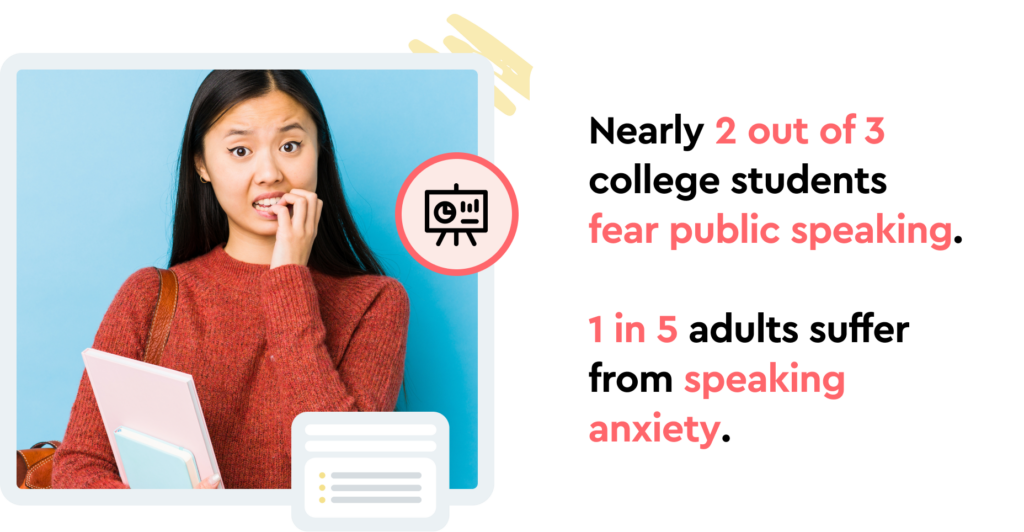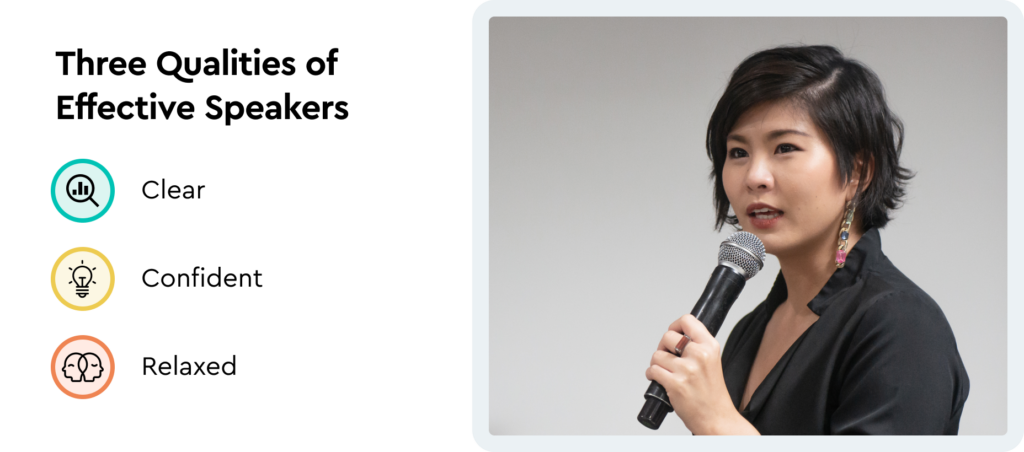Co-authored by William “Marty” Martin, PsyD (DePaul University), Susanna Gallor, Ph.D. (University of Massachusetts), and Michael Mason, Ph.D., LPC (University of Virginia)
Presenting, conveying information to others publicly, is a core competency for professionals in all disciplines. However, it is estimated that nearly two out of three college students fear public speaking. Additionally, one in five adults in the general population suffer from speaking anxiety. It has been said that more people fear public speaking than death itself. This may feel true for those who have significant anxiety about public speaking. A recent study found that while death is the most prevalent fear among people, public speaking is the second most prevalent, followed by financial problems as the third.
 Though speaking in front of a group is common in communication courses, it’s a reality for faculty in all courses and can come in many forms:
Though speaking in front of a group is common in communication courses, it’s a reality for faculty in all courses and can come in many forms:
- a student speaking in another language in a foreign language class
- a science major verbally sharing the results of an experiment or a lab report
- a business student pitching a business plan
- an acting major rehearsing their lines
- a psychology student responding to questions posed by the faculty in class
- a small group activity that requires students to collaborate on a project and then report to a larger group individually
- a student having to present before others as the lone presenter
Public speaking can occur in various course modalities—online, in-person, synchronous, or asynchronous. Fear and anxiety are not limited to specific nuances.
Three Qualities of Effective Speakers
The most effective speakers are clear, confident, and relaxed. Psychologists call this state of mind flow. It’s in this state that we can achieve peak performance while presenting. As a faculty member, emphasize to your students that one is not born a natural speaker or even a terrible speaker, but it is possible to cultivate skills to increase speaking effectiveness. Beyond being clear, confident, and relaxed, it is critical for students to learn how to effectively manage their fear and anxiety.

7 Ways To Guide Students in Reducing Speaking Fear and Anxiety
Eliminating fear and anxiety should not be the main goal. Some anxiety—or more specifically, arousal—is conducive to enhancing public speaking performance. In fact, a moderate amount of anxiety can actually be motivating and energizing.
- Normalize a moderate degree of arousal/anxiety for students. Say, “It’s OK to feel a bit nervous before speaking in public. It just shows that you care.”
- Instruct students about the power of self-talk. Once a student feels some moderate arousal, they may say to themselves, “I am anxious.” You can remind them that they have the choice to balance this thought with other thoughts and feelings they may be experiencing, such as, “I am excited.” This shift can help the student improve their mindset when approaching public speaking.
- Grant your students permission not to be perfect. This tendency to be perfect typically focuses on the outcome of performance, such as a grade. Sports psychology teaches us that focusing on process goals results in greater performance than focusing on outcome goals.
- Emphasize repeatedly the power of knowing your stuff and practice, practice, practice. Professional speakers will often say that it takes practicing a speech 10 times before it feels like their speech. Practice can involve presenting live, visualizing yourself presenting, or recording and reviewing yourself presenting.
- Pinpoint the power of breathing. Instruct your students on how to notice their breath, that is, inhaling and exhaling. Noticing is not changing. Noticing is not judging. Noticing is simply observing and being present with the breath. This technique can be quite useful right before presenting.
- Highlight the rhythm of a speech where nerves creep up – usually peeking up to the first word spoken and then declining after 20-30 seconds.
- Relax. Remind students that they can’t control how their message is received. Often, students can become distracted by anticipating how people may hear and perceive them. Please encourage students to focus on delivering their best and accept that people will receive it differently.

Celebrate Tiny Habits
As a faculty member, remember to focus on feedback that can be developmental and constructive, not just evaluative. By deploying developmental feedback, you can focus on how a student displays valuable speaking skills—such as pausing, volume, gestures, and visual contact. You can bring attention to what the student did well, discuss opportunities for improvement, and express appreciation for their effort and skill.
Providing meaningful feedback on presentation skills can help students develop what is an important lifelong skill. It can also help students identify stress and anxiety that presenting can spark. Identifying and understanding stress triggers can make it easier to develop ways to deal with it. As faculty, fostering an environment that is supportive and comfortable can make a difference in the overall mental health and wellness of students. You can find more ideas and resources for providing this type of support to students from other faculty in our Supporting Student Mental Health & Wellness webinar.









